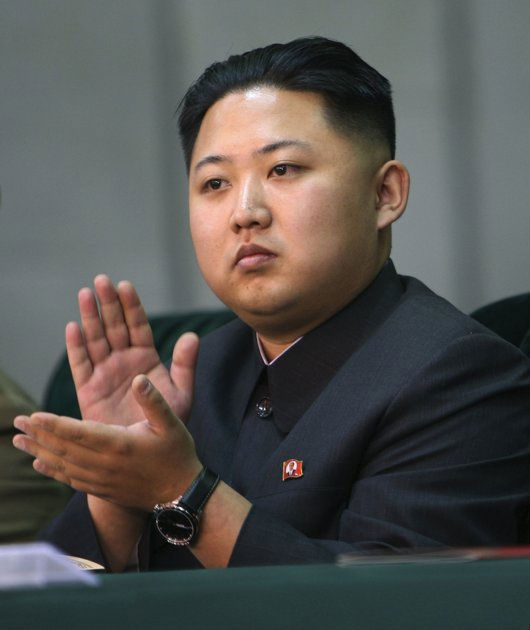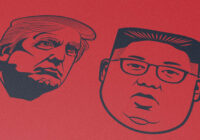Swiss-educated reformer Kim Jong-un is liberating North Korea by proliferating a capitalist, knowledge-based economy, says Michael Bassett.
When Kim Jong-il died, speculation ran awry that North Korea would either collapse or be taken over by hard-liners. Analysts watched doggedly as the young marshal, Kim Jong-un, emplaced a gang of seven in power—a gang whom his father had not recommended in the 6th Party Central Committee Plenum. Kim Jong-un’s affinity for these technocrats was temporary: That nearly all have been banished, purged or killed begs inquiry of the “method to his madness.”
As I will show, Kim Jong-un has defied all predictions and permanently changed the trajectory of North Korea.
During his three years of Confucian mourning, the young marshal acted like a force of nature, obsessively restructuring the basic tenants of reality in North Korea’s foundational doctrine. Jang Jin-sung correctly argues that Kim Jong-un executed his own uncle for trying to sell off state resources—in other words, North Korea’s sovereignty—but later misinterpreted the rationale of his measures. The rest of the world largely misread the reason for his uncle’s execution, and to make matters worse, Jang Jin-sung published a book propagating that Kim Jong-un was secretly governed by the Organization and Guidance Department.
This hypothesis fell short of explaining the radical changes he has imposed, and it lacks an explanation for the purges and executions he has committed. We must consider the possibility that Kim Jong-un has been purging anti-reform hard-liners. To understand the “method to Kim’s madness,” we must look at what Kim Jong-un has actually done and reflect critically over Jang Jin-sung’s hypotheses.
To claim that a secret organization is implementing structural changes fails to account for the fact that the changes are stripping themselves of power and spreading it across the board in a more democratic manner. It is more likely that Kim Jong-un is not a false figurehead, but instead has total control and is a reformer. Just like he removed his grandfather from the country’s currency, he has now removed the ideological damage imposed by his father, Kim Jong-il.
Liberty in North Korea
I suspect—like Rudiger Frank does—that in the 2016 Party Congress, the young marshal will announce that North Korea is adopting true reforms. We must consider that he knows unification could add $8.7 trillion to the global economy, and that 90% of North Korea’s problems could be solved by unification.
Since Kim Jong-un came to power, 406 state-sanctioned and more than 1,000 informal markets have sprouted in North Korea. Instead of stopping them, he has proliferated their existence by allowing markets to determine prices. These markets are not only “becoming the new normal,” but they’re selling an abundance of foreign goods, accepting foreign currency and electronic payment by card and even offering private financing as a payment option.
As a result of these combined liberties, start-up industries are spreading like wildfire. And despite some satellite imagery depicting a labyrinth of sanction-induced blackness, the markets are visible from space.
Some may still argue that Kim Jong-un is an evil dictator and that North Koreans are reforming the country from the bottom-up, but that does not explain the proliferation of a knowledge-based economy.
Critics must concede that the monopoly of first level of consciousness thought control can only be relinquished from the top-down. A knowledge-based economy means the state is encouraging its people to adopt new ways of thinking that are not part of traditional ideological tenants. This liberation of thought is evidenced by the newly-opened sci-tech center and Mirae District, which encourage and incentivize average North Koreans to adopt critical thinking skills if they wish to succeed.
If some are still not yet convinced that Kim Jong-un is not only a reformer, but a liberator, then consider the following: On two occasions, prisoners have been released back into society and are permitted upward social mobility in the Songbun Caste System by working in privately-owned markets. North Koreans are no longer confined within towns and provinces. Many have been engaged in cross-country travel that a market for navigation and lodging has sprouted as a result. In fact, the biggest revelations are that the state allowed 180,000 North Koreans to travel abroad in 2014, and it has opened an international calling center and welcomed the Agence France Presse to report from within North Korea, alongside Associated Press.
Becoming a “Normal State” Requires Normalization of Relations
The doors are wide open for science, sports, economic, political and even (state-sanctioned) religious engagement.
But the United States is the greatest barrier to unleashing the progress that North Korea is clearly on the brink of. Washington refuses to empower and enable these reforms without preconditions of Pyongyang abandoning its nuclear weapons program.
South Korean President Park Geun-hye’s offer of $63 billion a year to denuclearize the country matters little without a peace treaty and, therefore, brokering one is the best way for the US to stop being a barrier to North Korea’s liberation.
America should broker peace and unification on the Korean Peninsula, and instead worry about Chinese containment geo-strategy through a separate and less fatalistic lens. After all, China is a proven partner in global trade, and that aspect of the relationship should be continued and enhanced.
The US must seize the opportunity to play a productive role during the unification process and normalize relations with North Korea to allow for clearer communication and regional stability. To take any other measures would simply place America on the wrong side of history in one of the world’s longest-running conflicts. Being the main lien-holder on the armistice, the US is the only country that has the power to support a peaceful end to the war and broker unification in Korea. And as shown, an economic increase of $8.7 trillion should be enough incentive for those who have long been vested in maintaining the status quo—to change their course on parity with how Marshal Kim Jong-un has changed his leadership of North Korea.
If influencing these changes in North Korea—and waiting for them to occur—is not what “strategic patience” has always been about, then what is?
The views expressed in this article are the author’s own and do not necessarily reflect Fair Observer’s editorial policy.
Photo Credit: Attila Jandi / Shutterstock.com / Petersnoopy
 We bring you perspectives from around the world. Help us to inform and educate. Your donation is tax-deductible. Join over 400 people to become a donor or you could choose to be a sponsor.
We bring you perspectives from around the world. Help us to inform and educate. Your donation is tax-deductible. Join over 400 people to become a donor or you could choose to be a sponsor.
Support Fair Observer
We rely on your support for our independence, diversity and quality.
For more than 10 years, Fair Observer has been free, fair and independent. No billionaire owns us, no advertisers control us. We are a reader-supported nonprofit. Unlike many other publications, we keep our content free for readers regardless of where they live or whether they can afford to pay. We have no paywalls and no ads.
In the post-truth era of fake news, echo chambers and filter bubbles, we publish a plurality of perspectives from around the world. Anyone can publish with us, but everyone goes through a rigorous editorial process. So, you get fact-checked, well-reasoned content instead of noise.
We publish 3,000+ voices from 90+ countries. We also conduct education and training programs
on subjects ranging from digital media and journalism to writing and critical thinking. This
doesn’t come cheap. Servers, editors, trainers and web developers cost
money.
Please consider supporting us on a regular basis as a recurring donor or a
sustaining member.
Will you support FO’s journalism?
We rely on your support for our independence, diversity and quality.









Commenting Guidelines
Please read our commenting guidelines before commenting.
1. Be Respectful: Please be polite to the author. Avoid hostility. The whole point of Fair Observer is openness to different perspectives from perspectives from around the world.
2. Comment Thoughtfully: Please be relevant and constructive. We do not allow personal attacks, disinformation or trolling. We will remove hate speech or incitement.
3. Contribute Usefully: Add something of value — a point of view, an argument, a personal experience or a relevant link if you are citing statistics and key facts.
Please agree to the guidelines before proceeding.